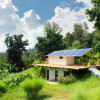
Discover the health, financial, and environmental perks of a self-sufficient lifestyle. Learn why more people than ever are choosing to live off the grid and reap the benefits of sustainability, independence, and connection to nature.
Stress Reduction and Better Health
Living off the grid often means closer connection to nature, leading to reduced stress levels and enhanced physical health. The natural environment offers cleaner air, chances for physical activity, and tranquility that's challenging to find in a city.
Financial Freedom and Independence
With an off-the-grid lifestyle, many of your living costs diminish or disappear. Whether it's solar energy or growing your own food, you'll become less dependent on the volatility of markets. Additionally, by using and valuing resources wisely, you learn to live within your means and reduce unnecessary expenditures.
Resilience and Self-Sufficiency
Living off the grid teaches skills of self-reliance and resilience. You'll learn to provide for your needs and to solve problems creatively. Dealing with unpredictable weather or tending to your solar system, you become more adaptable, independent, and empowered.
Environmental Responsibility
Off-the-grid living is inherently sustainable. By generating your own power and reducing waste, you’ll significantly reduce your carbon footprint. This lifestyle encourages responsible environmental practices like recycling and composting, fostering more sustainable habits and attitudes.
Strengthened Community Connections
Off-grid living often nurtures stronger connections with neighbors. With shared goals and values, people help each other, sharing resources and knowledge. This interdependence creates resilient, supportive communities.
Unplugging: Reclaim Your Time
Free from constant connectivity, off-grid life gives you the opportunity to spend time on things you truly value. With reduced technology dependence, you can embark on learning new skills, nurturing relationships, or simply enjoying peace and solitude.
















